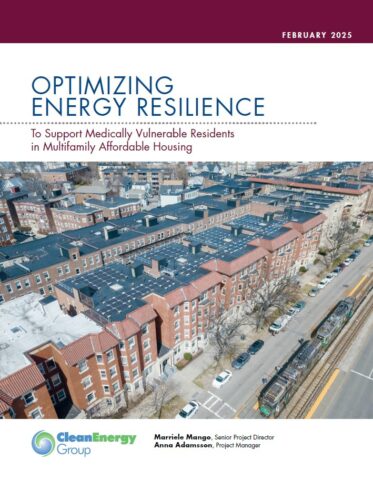Optimizing Energy Resilience to Support Medically Vulnerable Residents in Multifamily Affordable Housing
February 21, 2025
Marriele Mango, Anna Adamsson | Clean Energy Group
Power outages can quickly turn into a health crisis for the millions of Americans that rely on electricity for home medical devices, including life-support equipment (such as dialysis machines and ventilators) and technologies for independent living (such as electric wheelchairs, refrigeration for medicine, and internet for telehealth appointments). Many electricity-dependent residents live in multifamily affordable housing communities, yet affordable housing providers have limited access to programs that advance the development and affordability of backup power resources.
This report outlines opportunities for solar paired with battery storage to maintain electricity to essential services, both in-unit and in communal spaces, at multifamily affordable housing facilities. In addition to evaluating the health benefits of energy resilience in the event of an outage, the report explores potential economic benefits for both the provider and residents during regular grid operations.
The report centers around three case studies of multifamily affordable housing facilities in Connecticut. Each case study includes a technoeconomic assessment of three different resilient power scenarios, each tailored to support electricity-dependent residents in the event of an outage. Applicable incentives, including Connecticut’s Energy Storage Solutions program for battery storage, are applied to each scenario to maximize economic feasibility. The report concludes with recommendations for developing programs and policies that recognize solar+storage at affordable housing as necessary to public health in the event of an outage.
This report was prepared by Clean Energy Group with American Microgrid Solutions as part of the Climate Smart Technologies and Home Medical Devices for Affordable Housing initiative, an effort co-funded by the Robert Wood Johnson Foundation and Connecticut Green Bank and led in partnership with Connecticut Insurance Department, Operation Fuel, and the Yale Center on Climate Change and Health.
Associated Report: Emerging Public Health Needs for Climate Smart Technology in Connecticut Affordable Housing





